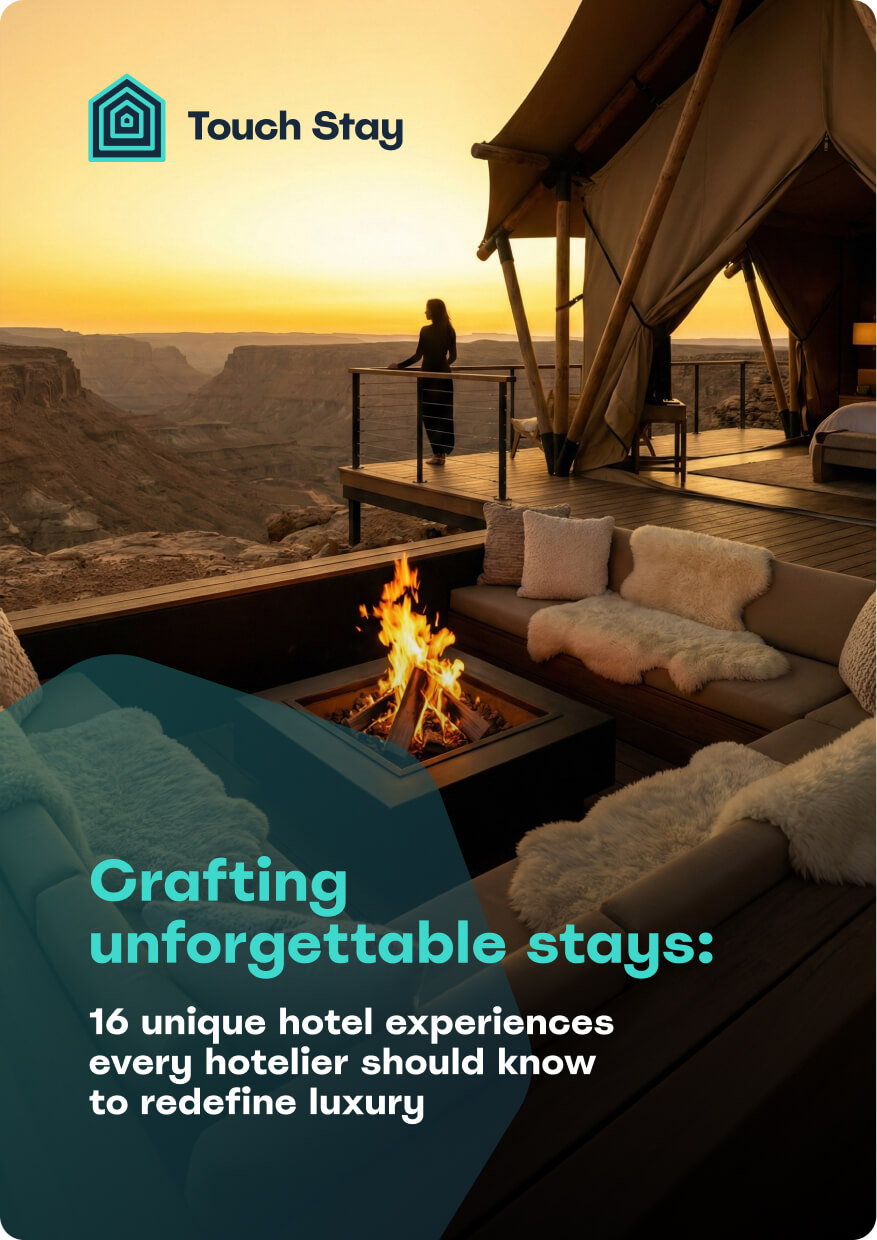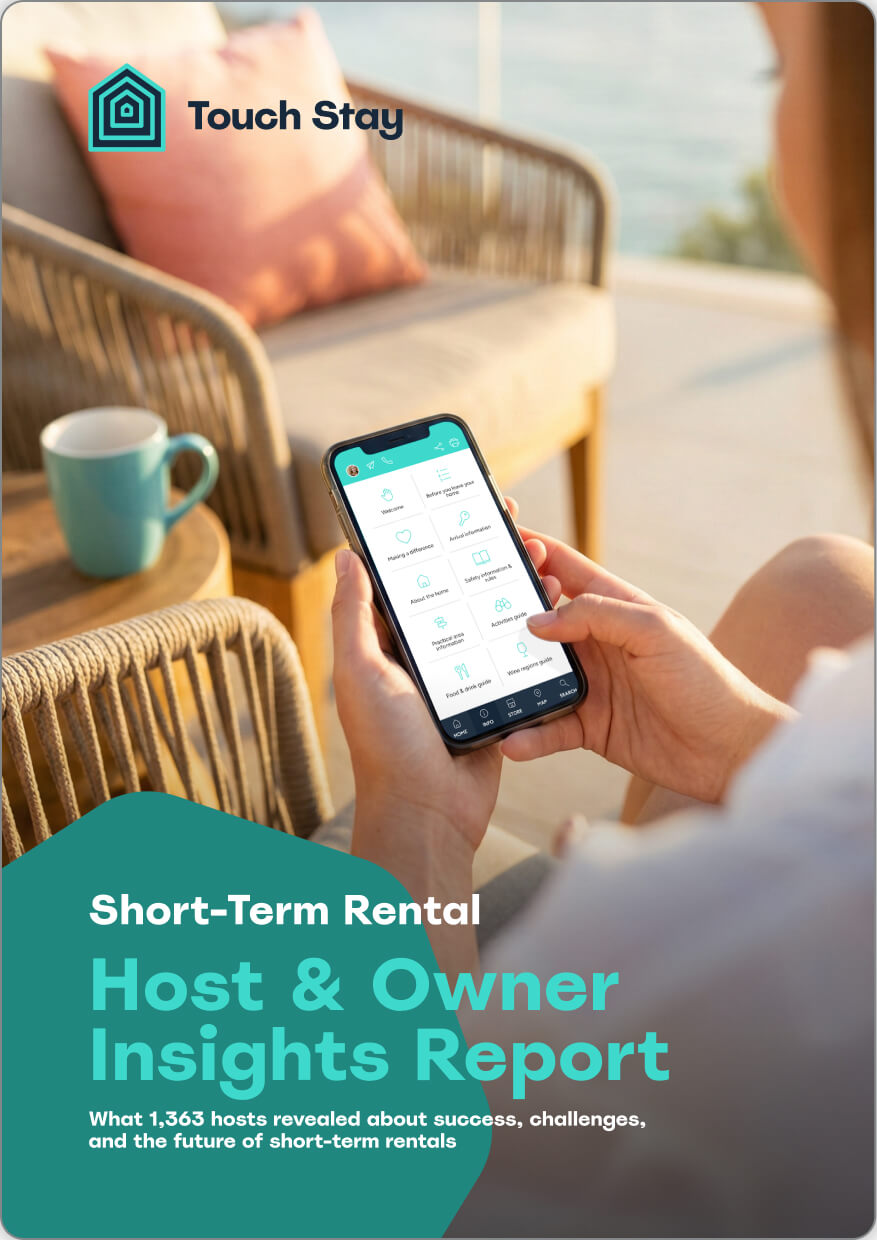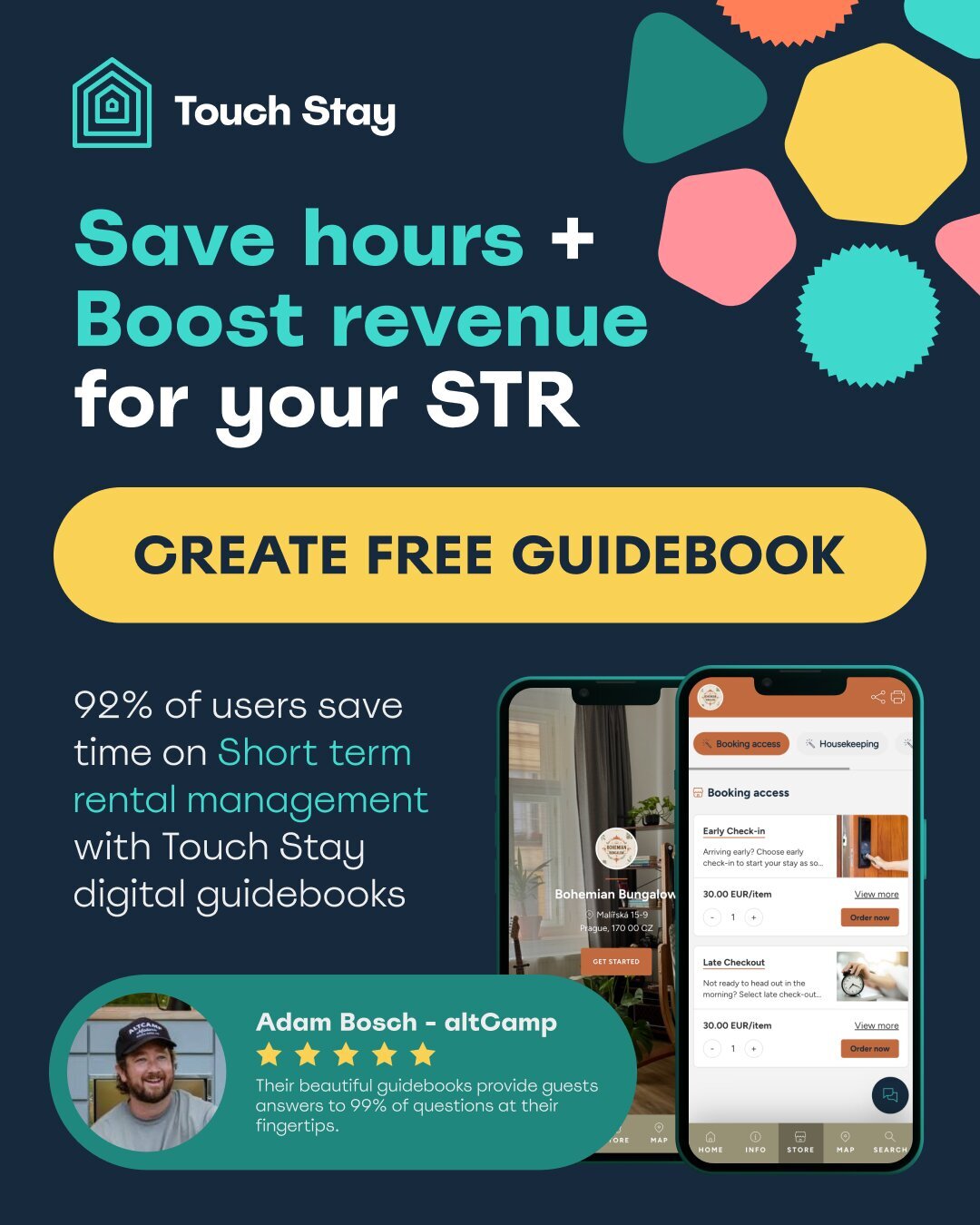The short-term rental market, spearheaded by platforms like Airbnb, has proven to be an incredibly lucrative venture. Who wouldn't want a slice of that passive income pie? For many aspiring hosts, however, the barrier to entry isn't a lack of business acumen or poor customer service skills; it's the colossal cost of purchasing the property itself. The dream of owning an Airbnb property often feels out of reach for those without significant savings or easy access to capital.
But what if we told you that there are legitimate, creative and proven strategies to acquire or control an Airbnb asset without spending a large sum of your own money upfront?
At Touch Stay, we know that successful hosting is about clever management; from streamlining guest communication with a digital guidebook to optimising your financial position. If you can master the upfront acquisition, the rest becomes about efficiency and guest experience.
Here are the 10 actionable tips we’ve compiled to help you navigate the world of short-term rental investment and potentially buy an Airbnb property with no money (or very little). Read on for:
- Can you buy an Airbnb property without money?
- How to own an Airbnb property with no money
- Things to keep in mind when obtaining an Airbnb property without money
- FAQs
Whether you’re starting with rental arbitrage or using investor capital, your time is your most valuable asset. Stop wasting it answering the same guest questions!
Give your guests the best possible experience while giving yourself back hours of your week.
Can you buy an Airbnb property without money?
The short answer is: not entirely, but you can certainly do it without your money.
In the purest sense, every property transaction involves money. Even if the asset is gifted, there are still legal, tax, and insurance costs. When people ask how to buy an Airbnb property with no money, they usually mean ‘How can I acquire a profitable short-term rental asset without having to fork out a huge deposit and closing costs from my personal savings?’
This is where the distinction lies. By leveraging other people’s capital (OPC) or employing creative real estate structures, it is absolutely possible to control, manage, and profit from an Airbnb property while keeping your own cash reserves untouched. The key is to shift your focus from owning the brick and mortar to controlling the asset and managing the income stream.
How to own an Airbnb property with no money
Here are the most effective strategies that aspiring short-term rental investors use to start their portfolio.
1. Leveraging existing property equity (HELOC/Cash-out refinance)
If you already own a home (even your primary residence) you may be sitting on a goldmine of unutilised capital!
- Home equity loan/ HELOC: A Home Equity Line of Credit (HELOC) works like a revolving credit card, allowing you to borrow up to a certain percentage of your home's equity. You only pay interest on the money you actually use.
- Cash-out refinance: This involves taking out a new mortgage that is larger than your current outstanding loan. You receive the difference in a lump sum cash payment, which can then be used as the deposit and closing costs for your new Airbnb investment property.
Whilst this isn't strictly 'no money' (as the loan needs repaying), it means you are using borrowed funds secured against an existing asset, not draining your savings account.
2. Investor capital
Why use your own money when someone else is looking for a good return? Approach private investors, friends, or family who trust your business plan and see the potential in the short-term rental market. You can structure this in several ways:
- Joint venture: The investor provides the capital (deposit and perhaps refurbishment costs) and you manage the property operations, splitting the profits 50/50 or based on an agreed-upon percentage.
- Secured loan: Treat the investor like a bank, offering a fixed return on their money, secured against the property.
3. Seller financing
In this scenario, the current property owner acts as the bank, agreeing to accept instalment payments (and typically interest) directly from you, the buyer, instead of requiring you to secure a traditional mortgage.
This is often used by sellers who want a quick sale or who want to defer capital gains tax. If you can find a motivated seller who is happy to become the lien holder, you can negotiate a much smaller (or even zero) down payment.
4. Partnership with property owner
This strategy is about finding someone who owns a property that is sitting vacant or underperforming as a long-term rental.
You approach them with a compelling pitch: you will handle the entire conversion process – furnishing, listing, marketing, guest management and maintenance – to turn their underperforming asset into a highly profitable short-term rental. The profits are then split between you and the owner.
This requires zero property purchase capital from you, only time, business skill, and perhaps funds for furnishings (which can also be financed).
5. Vacation rental franchise
Whilst less common in the UK, some real estate companies or established property management firms offer franchise-like models. You invest in the operating system and brand licence, and they might help you secure a property lease, finance the fit-out, or even manage the relationship with the property owner.
This drastically reduces the capital required for the property itself, focusing your investment on the business operations.
6. Using your own vacant property
Do you have a basement flat, a granny annex, a second home, or even a section of your primary residence that is currently going unused?
The fastest and most capital-efficient way to get started is by converting an existing asset into a short-term rental. Your 'cost' is only the time and minor upgrades needed for guest readiness. This strategy requires zero upfront property purchase money.
7. Airbnb rental arbitrage
This is perhaps the most popular 'no purchase money' strategy. Rental arbitrage means leasing a property long-term (e.g., a standard 12-month tenancy agreement) and, with the explicit permission of the landlord, renting it out on a short-term basis via platforms like Airbnb.
Your upfront cost is typically limited to the security deposit, the first month’s rent, and the cost of furnishing. Your profit comes from the difference between the monthly long-term rent you pay the landlord and the cumulative short-term income you generate.
Pro tip: Discover more with our complete guide to Airbnb rental arbitrage.
8. Rent out a free room
If you own your home, or even if you are a long-term tenant who is permitted to sub-let (always check your tenancy agreement!), renting out a spare room is the ultimate low-cost entry point.
Your only upfront investment is ensuring the room is clean, comfortable and well-equipped. This allows you to gain invaluable experience as a host, start generating cash flow, and build credibility before moving on to larger investments.
9. Co-hosting
Co-hosting is a service business rather than a property ownership strategy, but it can lead to ownership. You offer your skills in property management, guest communication and digital optimisation (like setting up a stellar digital guidebook) to existing hosts who are time-poor.
You earn a percentage of the booking revenue. Once you’ve built up a strong portfolio of managed properties and a track record of high-performing rentals, you can use that proven success to secure an investor loan or partnership to acquire your own asset.
Pro tip: Check out our popular guide to Airbnb co-hosting.
10. Assumable mortgage
An assumable mortgage is a rare but powerful option. This allows a buyer to take over the seller’s existing mortgage, keeping the same terms (interest rate, repayment schedule, and principal balance).
This is most common with certain government-backed loans, and its main advantage is bypassing the need for a new loan application and potentially securing a much lower interest rate than currently available on the market. The only major cost is usually a smaller cash payment to the seller for the equity they’ve already built up.
Tip: Tools like PropStream pricing can help analyze potential properties, assess market value, and make informed investment decisions before committing any capital.

A common challenge for new hosts is finding the time to manage bookings and answer the same guest questions repeatedly. This is where efficiency comes in.
Ready to streamline your hosting operation and save hours every week?
Start by setting up a digital guidebook that answers everything before guests ask.
Things to keep in mind when obtaining an Airbnb property without money
While the upfront capital might be minimal, the risk and responsibility are not. Here are critical factors to consider:
- Determine the location: Research is paramount. The location must not only be desirable for tourists but also legally permissible for short-term rentals (check local council rules, planning permission, and any HOA/leasehold restrictions). The best strategy in the world will fail if the location is wrong.
- Calculate the ROI (return on investment): Even without a large down payment, you must be confident that the operating profit will comfortably cover all expenses – mortgage, utilities, management fees, cleaning costs, and the all-important vacancy rate. A thorough financial model is non-negotiable.
- Focus on the guest experience: Whether you own the property or are using rental arbitrage, your reputation is everything. Exceptional guest service translates directly into five-star reviews, which drives higher occupancy and better pricing. Using tools like Touch Stay to provide comprehensive, accessible, and beautiful property information is a simple way to elevate your offering and manage expectations.
- Have an exit strategy: What happens if the short-term rental market in your area crashes, or the property owner decides to sell? All agreements, especially for partnership and rental arbitrage, must clearly outline the exit terms and the rights of all parties involved.
- Build your credit and business plan: Lenders and investors alike are primarily interested in risk mitigation. A strong personal credit score and a meticulously researched, professional business plan are essential for convincing them to part with their money, or for a seller to trust you with their property.
Great hospitality isn't just about a nice property; it's about seamless communication. Digital guidebooks slash the number of repetitive guest questions, freeing up your time to focus on scaling your business, not just servicing it.
Ready to unlock the power of effortless hosting?
Frequently asked questions
No. While you will always need some form of capital for operational costs (furnishings, cleaning supplies, and early-stage marketing), the strategies mentioned above, such as co-hosting and rental arbitrage, allow you to enter the business and start generating revenue without the hundreds of thousands required for a property purchase deposit. You trade financial capital for business acumen and time.
The most direct way to own the property (rather than just manage it) without using your savings is by leveraging other people’s capital. This includes securing loans against existing assets (HELOC or cash-out refinance), using investor capital in a joint venture, or arranging seller financing. These methods allow you to acquire the title using borrowed or deferred funds.
Historically, yes. Short-term rentals offer two primary advantages over traditional long-term rentals: higher cash flow potential and greater flexibility in pricing and use. However, the regulatory landscape is constantly evolving, and success hinges entirely on location, diligent management and exceptional guest experience. If managed effectively, with an eye on efficiency and reducing operational friction, Airbnb properties can be an excellent way to diversify your investment portfolio and build long-term wealth.

Ned
Ned has clocked up over 11 years in digital marketing and comms, with a strong focus on creating engaging content for a range of brands and agencies. When he’s not writing, he can be found digging for records, peering through his telescope at the night sky, or onboard his local lifeboat where he volunteers as a crewmember.
Be the first to know!
Join our newsletter for early access to:
- ✅ Free guides
- ✅ Pro tips & tricks
- ✅ Time saving tutorials
- ✅ Latest blog posts
- ✅ Checklists & templates






















